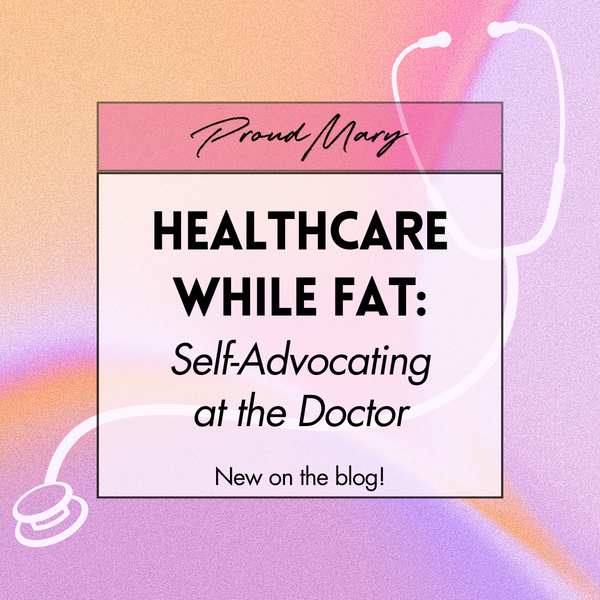Healthcare While Fat
Posted on May 31 2023

*This article is not intended as medical or legal advice. Please always check with your doctor or lawyer when appropriate.
CW: Discussion of fatphobia, medical trauma, weight, mentions of disordered eating, and weight loss surgery.
In my experience, when discussing healthcare with larger-bodied folks, it's rare that the subject of weight discrimination doesn’t come up.
Patients can experience weight discrimination with general practitioners, specialists, mental health professionals, and even doctors you wouldn’t expect, such as dentists.
I once had a dentist ask if we could discuss my weight. I answered "No, you don't have my consent to discuss my weight." He quickly moved on, but I still do not understand how that had anything to do with my dental checkup.
Unfortunately, fatphobia is deeply ingrained in the healthcare industry.
Experiencing weight-based discrimination at the doctor, especially over time, can cause medical trauma and health anxiety, which may lead to avoiding seeking care in the future.
This can lead to preventable health problems.
Recently, I turned to social media to ask if anyone had experienced fatphobia at the doctor.
“I went in with debilitating allergies and left with a lecture on intermittent fasting” said one person.
“He said ‘not enough people think of weight loss surgery as a first line option.’” shared another.
Weight bias in medicine can cause doctors to prioritize thinness over health.
This can lead to overprescribing dangerous surgery and encouraging disordered eating. These behaviors risk lifelong health issues or worse.
Always remember that as a patient, you have rights.
It's important to note that you should not have to self-advocate with the very people who should be trained to treat you without causing harm.
You also may not have many options depending on your insurance, your location, your financial situation, your physical and psychological safety, and other factors.
It’s okay if you can’t or don’t advocate at the doctor, because at the end of the day, this isn't something you should have to do.
If you are looking for tips on how to find doctors and speak up while in their care, read on for our advice.
You can pre-screen your doctor
This is true for any doctor or healthcare professional. You can interview therapists, general practitioners, gynecologists, and even dentists to see if they're the right fit for you.
First, you can search for reviews of them online. You can see if they have any special experience that may serve you, such as being trauma-informed. You can check Yelp and Google Reviews as well as websites such as ZocDoc, HealthGrades, and Psychology Today.
In some instances, you can set up a phone consultation prior to making an appointment. This is especially true for mental healthcare. For other doctors, you may have to screen them at your first appointment, depending on their policy.
If you have suffered from medical trauma, you can let your doctor know this and ask how they are accommodating.
Here are some questions you can ask in the screening process:
1- "Are you familiar with HAES (Health at Every Size)?"
2- "Will you be able to treat me with a weight neutral approach?"
3- "Do you believe that people of every body size deserve the same standard of care?"
4- "I’d like to partner in my treatment plan. Do you take a collaborative or open approach?"
5- "Are you trauma-informed?"
You can refuse to be weighed or to discuss your weight
If you do not consent to being weighed, you can decline. You can also let the doctor and/or staff know that you do not wish to discuss your weight.
An example of what you can say:
“Before we start, I’d like for you to treat me with a weight-neutral approach today.” or “I just want you to know that I will need you to ask for consent when bringing up weight.”
You can completely decline, or if weight may be a factor in your care then you can request that they ask for consent before discussing.
You can insist on the correct equipment
If you have a larger arm, ask for a large arm cuff for accurate blood pressure measurements. The wrong size cuff can negatively affect your blood pressure reading, causing it to appear higher.
Your doctor should have the correct equipment for measuring your vitals. If they don't, you can ask them to put in your chart that they weren’t able to accommodate you.
Anxiety at the doctor's office can also cause a higher blood pressure reading. If you suffer from anxiety, you can let your nurse know that it may affect your blood pressure numbers.
You can tell them to notate your chart
If you have asked for certain treatments or brought up an issue, but the doctor keeps steering the conversation to your weight, you can insist that they notate your chart.
Examples of how to ask:
“Please notate in my chart that you refused the care I am asking for.”
You can ask them to back up their treatment plan
If a doctor is prescribing weight loss for an issue you don’t feel warrants it, you can ask them to elaborate.
Examples of what you can ask in this situation:
1- “Can you elaborate on exactly how my weight is relevant to my diagnosis or symptoms?”
2- “I’d like to know how you’d treat someone in a thin body with this same issue.”
3- “Can you cite a study that proves weight loss is effective against my symptoms/diagnosis?”
You can bring someone with you
Sometimes it's easier to advocate for yourself when you have support. Consider bringing a supportive friend or partner with you to your appointment.
Their presence may help keep you grounded and they may be able to help advocate if they are familiar with your care.
You can prep them with things to listen for, or even use a safe word to let them know you’d like to end the appointment and leave.
You can leave
If you are experiencing fatphobia in a doctor’s office, you have every right to leave.
Years ago, I was in my doctor’s office, who I had been seeing for years. I went in for a non-weight related issue, and she kept steering the conversation back to my weight.
I wasn’t feeling heard, so I stood up and said “You are not listening to me so I am ending this appointment.”
Later that evening, she called me and apologized.
It was scary to get up and walk away, but we all deserve to be heard. Healthcare professionals are there to TREAT you, not to demean you.
You are an expert of your own body, and as the patient, you have rights and deserve to be a collaborator in your own care.
You can review and report them
Doctors take an oath to do no harm.
Doctors are also regulated by state licensing boards.
You can review them on Yelp, Google, or sites like Zocdoc to let others know of your experience.
You can also Google ways to file a complaint against your doctor in your specific state. There are people who oversee healthcare professionals and will investigate these complaints.
If you have experienced harm, then you have every right to file a complaint.
If you are searching for a doctor, you can turn to your network.
You might have a friend with a doctor they really like, but you won’t know until you ask. I have found some great doctors by asking friends.
If you have a doctor in one specialty that works well for you, you can also ask them for referrals within your network.
Discuss your specific concerns with them. Sometimes, they may have someone in mind or be able to ask colleagues for referrals.
More resources:
The Association for Size Diversity and Health (ASDAH)
The National Association to Advance Fat Acceptance (NAAFA)


1 comment
This is an excellent, simple guideline. Thank you so much.